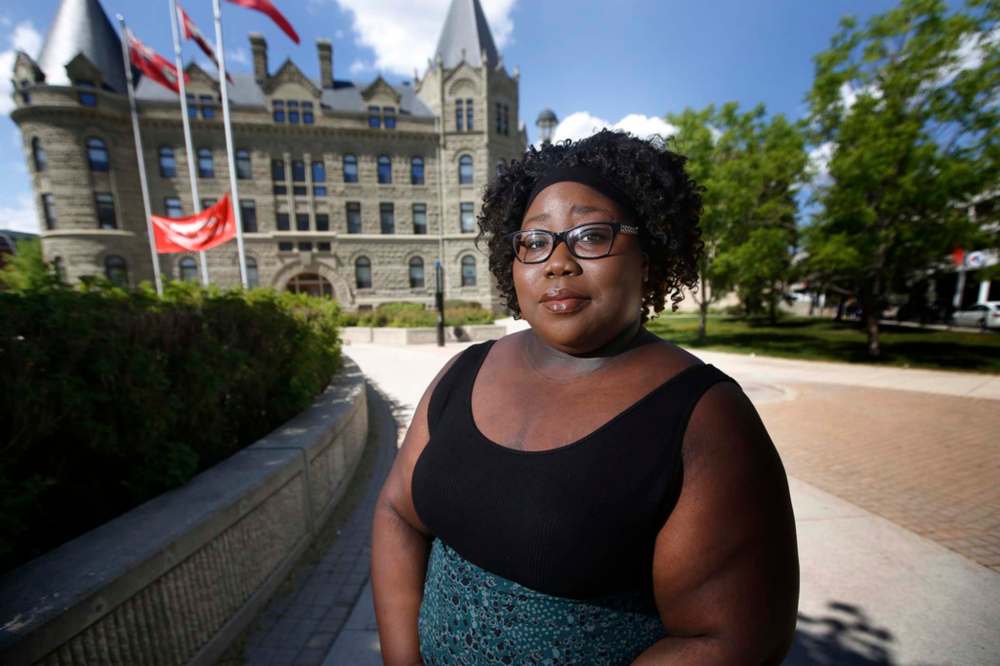Posting hashtags easy, changing attitudes isn’t, community members say
Advertisement
Read this article for free:
or
Already have an account? Log in here »
To continue reading, please subscribe:
Monthly Digital Subscription
$19 $0 for the first 4 weeks*
- Enjoy unlimited reading on winnipegfreepress.com
- Read the E-Edition, our digital replica newspaper
- Access News Break, our award-winning app
- Play interactive puzzles
*No charge for 4 weeks then billed as $19 every four weeks (new subscribers and qualified returning subscribers only). Cancel anytime.
Read unlimited articles for free today:
or
Already have an account? Log in here »
Hey there, time traveller!
This article was published 01/06/2020 (1424 days ago), so information in it may no longer be current.
Waking up Tuesday morning, Charmaine Jennings flipped through her Instagram feed as people around the world began turning their photos to black squares.
The black squares were a part of a social media movement using the hashtag “blackout Tuesday.” While a physical rally hasn’t yet taken place in the city, the protests across the United States that began with the death of George Floyd and the conversations being drummed up about racism and police violence are still having an enormous impact locally, with social media bringing everyone to the table.
Jennings — a social media manager and community leader in Winnipeg — is skeptical of these small shows of support. She posted in her own feed advising followers that if they were posting black squares only because they were worried about keeping up appearances, the gesture is meaningless.

“For a lot of people, that’s the first thing they’ve posted in relation to what’s going on,” she said on Instagram.
With a background in public relations and social media, Jennings said she isn’t surprised to see confusion around how to demonstrate solidarity and allyship right now.
“For me, it’s confusing all around. It’s confusing for everyone, whether you’re black, white brown, it’s confusing for all of us,” she said, adding she recognizes that many people are well-intentioned.
Those who don’t know what to do should instead share black voices, and focus on listening, she said.
The worry is that some of these online campaigns might do more to silence black people, rather than raise them up.
For Naila Janzen, the Winnipeg-based artist and designer behind Rox Textiles, seeing the flood of posts on social media — both the black squares and others — is just a part of the tense moment we’re in, something that’s also reflected in the conversations she’s having with friends.
“It feels like being retraumatized, over and over and over again. When you spend your whole life experiencing subtle — and overt — racism, you try to bury it and just keep on moving, because you have to survive and try to thrive,” Janzen said.
“And all those little and big moments of racism pile up. And when something is happening in the world like right now — this time that we’re in — it’s just gut-wrenching.”
Absorbing all of that is exhausting, she says.
“It is all-encompassing, all around us, like air,” she said.
When she sees little black squares on Instagram, she says she feels like she’s being acknowledged, which may be a good start. But she echoed Jennings’ concern, in that if that’s all it is, it isn’t enough.
“That is like saying, ‘Hi. I see you.’ That is not enough to even scratch the surface,” she said.
Both women said they don’t speak for the black community because they’re black, but offered suggestions for how allyship and solidarity could be more genuinely pursued.
First, it shouldn’t be hypothetical support, Jennings said.
“For me, as a black woman, what’s more important to me than you calling yourself an ally, is I want to see: do you actually have black friends? If I go to your birthday party, am I going to see black people there? If I go to your wedding, will they be there? Or are you just talking about it on your influential platform because you’re trying to build this ally title for yourself?”
Janzen said more meaningful support would involve following four steps: educating yourself; identifying your biases; changing your thought patterns — “you need your default to be something that is supportive, seeks justice and equality. That needs to be your default”; and sharing.
“But don’t just post it. Do something,” she said.
Action can look different to different people, but she suggests even starting an anti-racism book club would be helpful.
“It’s painful to see racism in yourselves. That’s painful,” she said, but growing that support and empathy will bring change.
Even if social media, in many instances, represents token support, Janzen says she thinks putting it online helps. She said she’s not usually comfortable discussing her race but that’s changed, even if only temporarily.
“For me it’s just felt like a taboo subject. People get so uncomfortable and, also, it’s uncomfortable for me,” she said.
What is the most shocking to her, is that she thinks people might, slowly, be getting it, she said.
sarah.lawrynuik@freepress.mb.ca










